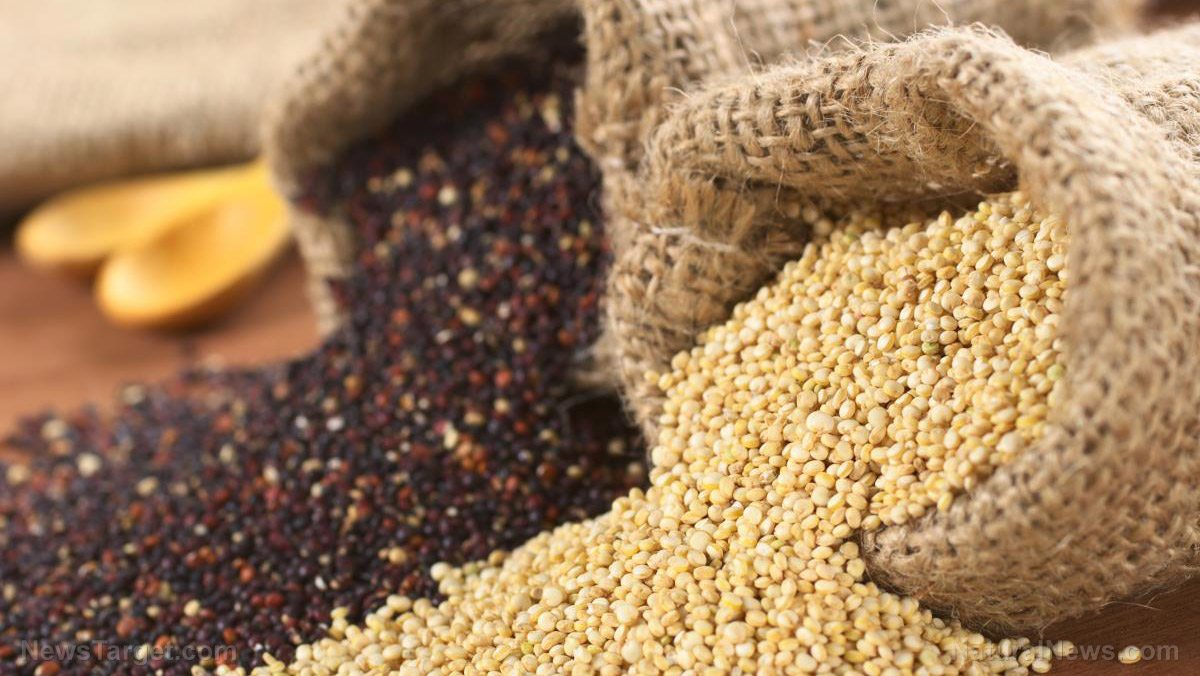21 Healthy plant-based sources of protein for vegans and vegetarians
04/15/2019 / By Zoey Sky

Do you get your protein from red or lean meat? Or do you prefer beans, nuts, and seeds? If you want to increase your protein intake without eating meat for health or personal reasons, there are many alternative sources of protein to choose from, most of which are plant-based.
What is protein?
You consume foods that contain protein almost every day. However, unlike other main macronutrients like carbs and fat, your body is unable to store protein.
You need protein to build, maintain, and repair almost all the tissues in your body. This includes your hair, nails, bones, muscles, blood, and organs. Aside from giving the body energy, protein also keeps the immune system strong.
Protein is made up of 21 amino acids. The human body can make 12 of them, but there are nine essential amino acids that come directly from food.
Protein is important because gram for gram, it’s more satisfying than either carbohydrates or fat. This means protein helps you feel fuller for longer periods. (Related: Plant proteins found to help prevent Type 2 diabetes.)
Take note that the daily recommended dietary allowance (RDA) is 0.8 g of protein per kg of body weight. For the average male or female adult, this is equivalent to about 46-56 g of protein per day. For reference, a three-ounce, fist-sized hamburger patty has 24 g of protein.
If you want to build more muscle, this doesn’t mean you need to eat more red meat. In fact, you can get enough protein from these alternative sources.
- 1 cup peanuts (41 g of protein)
- 1 cup pumpkin seeds (39 g)
- 1 cup cheese (36 g)
- 1 cup tempeh (34 g)
- 1 cup low-fat cottage cheese (28 g)
- 1 cup oats (26 g)
- ½ cup tofu (22 g)
- 1 cup non-fat Greek yogurt (22 g)
- 1 cup kidney beans (21 g)
- 1 cup white beans (19 g)
- 1 cup pinto beans (19 g)
- 1 cup lentils (18 g)
- 1 cup edamame (17 g)
- 1 cup lima beans (15 g)
- 1 cup chickpeas (cooked, 14.5 g)
- 1 veggie burger (11 g)
- 2 tbsp peanut butter (9 g)
- 1 cup tofu yogurt (9 g)
- 1 cup quinoa (cooked, 8 g)
- 1 cup soy milk (7 g)
- 1 tbsp miso (2 g)
Veggie burger formula
Why buy pre-made veggie burgers that contain harmful ingredients if you can make them yourself? Check out the easy veggie burger formula below and make your own recipe using your favorite ingredients.

This recipe makes about 18 small burger patties.
Veggie burger formula
Ingredients:
- 1 pound can of beans, drained and rinsed or 1.5 cups of cooked beans
- 1/2 cup chopped onion
- 1 clove garlic, minced
- 2 cups diced veggies (E.g. carrots, celery, chopped artichokes, corn, mushrooms, or zucchini)
- 2 tsp and 2 tbsp oil for frying (E.g. coconut or olive oil)
- 3 tbsp liquid flavor (Mix and match ingredients like balsamic vinegar, ketchup, marsala, mustard, pasta sauce, salsa, soy sauce, vegan Worcestershire, or water.)
- 4 tsp spice (Combine two spices such as black pepper, cayenne pepper, chili powder, cumin, curry powder, fennel, oregano, or paprika.)
- 1/2 tsp kosher salt (Omit or reduce if your liquid or spice already has salt.)
- 1 cup dry base ingredient (Try bread crumbs, buckwheat, cornmeal, or oatmeal.)
- 1/2 cup texture ingredient (E.g. avocado, basil, chopped walnuts, cilantro, olives, parsley, or sun-dried tomatoes)
Steps:
- Heat two teaspoons of oil in a pan over medium heat, then fry the garlic, onion, and other vegetables until they soften for about five minutes.
- Transfer the ingredients to a food processor and pulse the beans, liquid flavor, spice, and salt. Pulse until the mixture is combined but still chunky.
- Add the dry base and texture ingredients, then pulse.
- When you’re done, form the mixture into golf ball-sized chunks and flatten into patties.
- Heat two tablespoons of oil over medium-high heat. Fry the veggie burger patties at least two to three minutes per side until they’re browned and heated through.
Meat isn’t the only source of protein out there. You just have to know where to look. Visit Veggie.news for more stories on plant-based alternatives to meat.
Sources include:
Submit a correction >>
Tagged Under:
beans, cheese, edamame, Greek yogurt, lentils, milk, miso, natural ingredients, nuts, oats, plant protein, protein, Quinoa, seeds, tempeh, tofu, vegan, vegetarian
This article may contain statements that reflect the opinion of the author





















